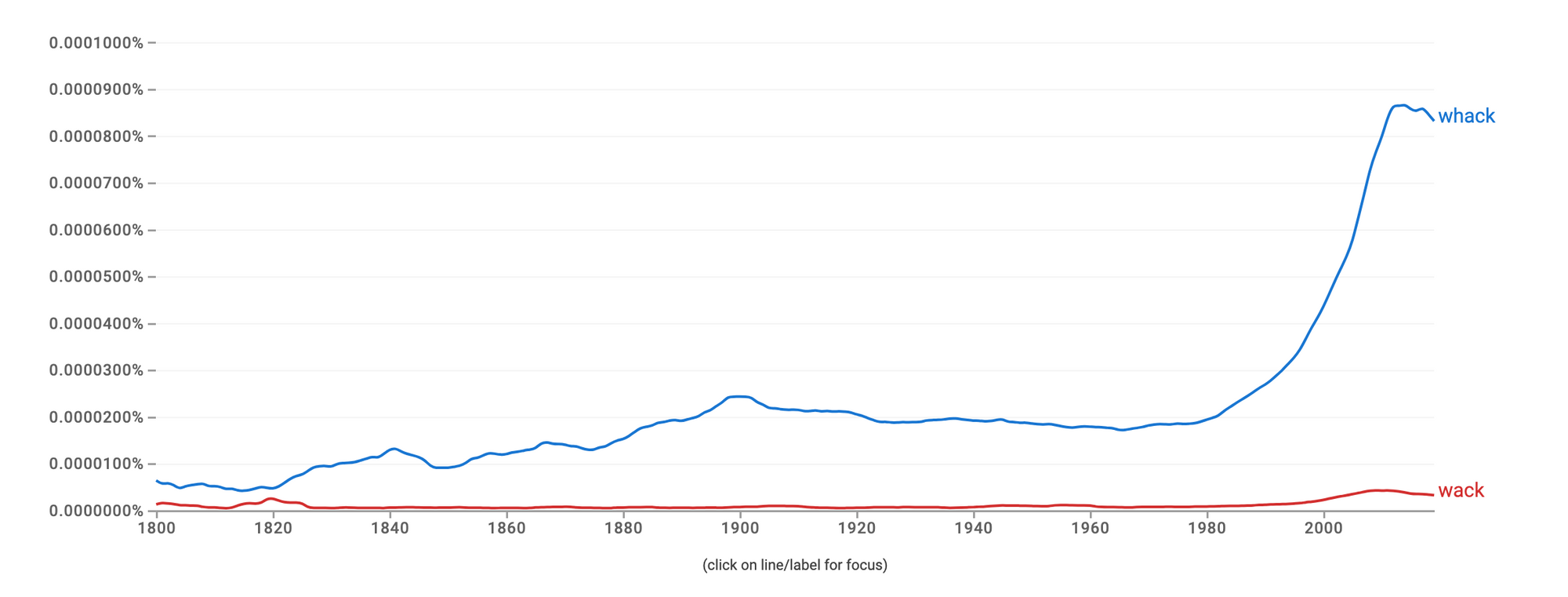Whack
- Formal: Whack refers to striking something with force.
- Informal: Can carry the same meanings as "wack" used as an adjective.
Wack (adjective):
- Informal: 1. Strange, unusual, or a bit crazy 2. Very tired or exhausted.
Whacked or Wacked are the past tense of the Whacked and Wack.
🔨 After attempting to fix the broken shelf, he gave it a frustrated whack with the hammer, hoping to secure it in place.
💻 The new employee found the company's outdated computer systems and software to be incredibly wack, hindering efficiency and causing frustration among the team.

Whack:
Part of Speech: Verb (Past Participle) or Adjective
Verb:
- Past participle of "whack": Having been hit or struck forcefully. ("The window was whacked by a fallen branch.")
Adjective:
- Informal: Can carry the same meanings as "wack" used as an adjective, like strange or tired. ("That joke was totally whacked, but it made me laugh.")
Wack:
Part of Speech: Adjective or Verb
Adjective:
- Informal: Strange, unusual, peculiar, bizarre. Often with a humorous or playful connotation. ("That outfit is totally wack, but I kind of love it.")
- Slang: Exhausted, worn out, very tired. ("I'm wack after that long hike.")
Verb:
- Slang: To hit or strike something forcefully. Primarily used in informal contexts. ("He accidentally whacked his head on the doorframe.")
Key Differences:
- "Wack" is most commonly used as an adjective, while "whacked" is typically the past participle of "whack."
- "Wack" has a wider range of meanings, including slang verb uses, while "whacked" generally sticks to adjective and past participle functions.
- Both words retain informality and are best used in casual contexts.
If you look at the graph below, we can see that "whack" and "wack" are used in different amounts. "Whack" is used to a greater degree than "wack."

How do we pronounce whack and wack?
In American English, "whack" and "wak" is pronouned wak.
In British English, "whack" and "wak" is pronouned wak.
These are just the standard pronunciations, and there may be slight variations depending on regional accents and individual speech patterns.
Why is there confusion between whack and wack?
The confusion between "whack" and "wack" stems from a few key factors:
- Homophony: They share the same pronunciation, "hwak-d," making them homophones, words that sound the same but have different meanings and spellings. This inherent ambiguity naturally leads to confusion.
- Informality: Both words are primarily used in informal contexts, where language tends to be more flexible and nuanced. This means precise distinction isn't always prioritized, further blurring the lines.
- Multiple Meanings: Both words have multiple meanings, adding another layer of complexity. "Whack" can be a verb (to hit), an adjective (strange, tired), and even a slang term for killing. Similarly, "whacked" can be the past participle of "whack," or share the adjective meanings of "whack."
- Context Dependence: Both words rely heavily on context to reveal their intended meaning. A single sentence can interpret "whack" differently depending on surrounding words and the overall tone.
Origins of whack
Tracing the origins of "whack" and "whacked" takes us on a wild linguistic ride! Buckle up, word explorer!
Whack:
- Verb: This one hails from Middle English, evolving from "whappen" which meant to strike or beat. Later, it morphed into "whack" and solidified its meaning as hitting forcefully.
- Adjective: This side of "whack" is a much younger sprout, popping up in the 1960s as slang for strange, unusual, or crazy. This likely developed from the unexpected impact of a forceful whack, figuratively applied to ideas or situations.
Origins of wack
Early Seeds:
- Mid-17th century: The verb "whack" emerges, meaning "to strike violently." Imagine the sound of a blacksmith hammering metal or a woodcutter chopping logs.
- Late 19th century: The adjective "wacky" pops up in British slang, describing something foolish or eccentric. Think wacky antics of stage clowns or silly hats.
The Great Wackification:
- 1930s: "Wacky" crosses the pond to America, finding its way into jazz circles and pop culture. Think wacky characters in cartoons or wacky dance moves.
- 1960s: Boom! "Whack" evolves into slang, taking on the meaning of "strange" or "uncool." This is the "wack" we know and (sometimes) love today. The exact reason for this shift is unclear, but some speculate it's tied to the counterculture movement's rejection of mainstream norms.
- Later Developments: "Whack" continues to evolve, gaining additional meanings like "tired" or even "bad" (as in "that movie was whack"). It also becomes associated with African American Vernacular English (AAVE).
Example Sentences with whack
Here are some example sentences using "whack" in a variety of engaging and respectful ways:
As a Verb:
To hit forcefully:
- "The chef expertly whacked the garlic clove with the flat of her knife, releasing its aroma."
- "The tennis player whacked the ball across the court, scoring a stunning point."
- "The drummer whacked the cymbals with a dramatic flourish, signaling the song's crescendo."
To cut something roughly:
- "The gardener whacked back the overgrown bushes to create more space for flowers."
- "The tailor whacked off a few inches from the hem of the dress to adjust the length."
- "The sculptor whacked away at the block of marble, revealing the beginnings of a masterpiece."
As an Adjective:
Strange, unusual, or wild:
- The artist's studio was a whack explosion of colors and textures, inspiring creativity.
- Her fashion style was delightfully whack, mixing patterns and colors in unexpected ways.
- The plot of the movie took a whack turn halfway through, leaving everyone guessing.
Tired or exhausted:
- After a long day of hiking, we were totally whack and ready for a cozy night in.
- The kids were whack after the birthday party, but they still managed a few giggles before bed.
- I'm feeling pretty whack after that intense workout, but in a good way!
Example Sentences with wack
Here are some example sentences with "wack" that showcase its diverse meanings and usages, while remaining respectful and appropriate:
Verb:
- Hitting forcefully:
- The blacksmith wacked the hot iron with his hammer, shaping it into a beautiful horseshoe.
- The guitarist wacked a power chord, sending a blast of energy through the crowd.
- The chef wacked open the coconut with a deft swing of the machete, revealing its sweet flesh.
Adjective:
Strange, unusual, or wild:
- The movie featured a totally wack plot twist that nobody saw coming.
- His collection of hats was a glorious, wacky mismatch of colors and styles.
- The scientist's theory sounded a bit wacked, but it actually held some potential.
Tired or exhausted:
- After dancing all night, I was feeling seriously wacked the next morning.
- The long hike left us all wacked, but the view from the peak was worth it.
- Studying for hours straight made my brain feel totally wacked, but I managed to finish the project.
Want to sound like a native speaker?
Engram’s AI-powered grammar checker makes your English sound like a native speaker’s, suggesting natural English expressions on top of fixing grammar, spelling, punctuation, word order, and vocabulary.

References:















